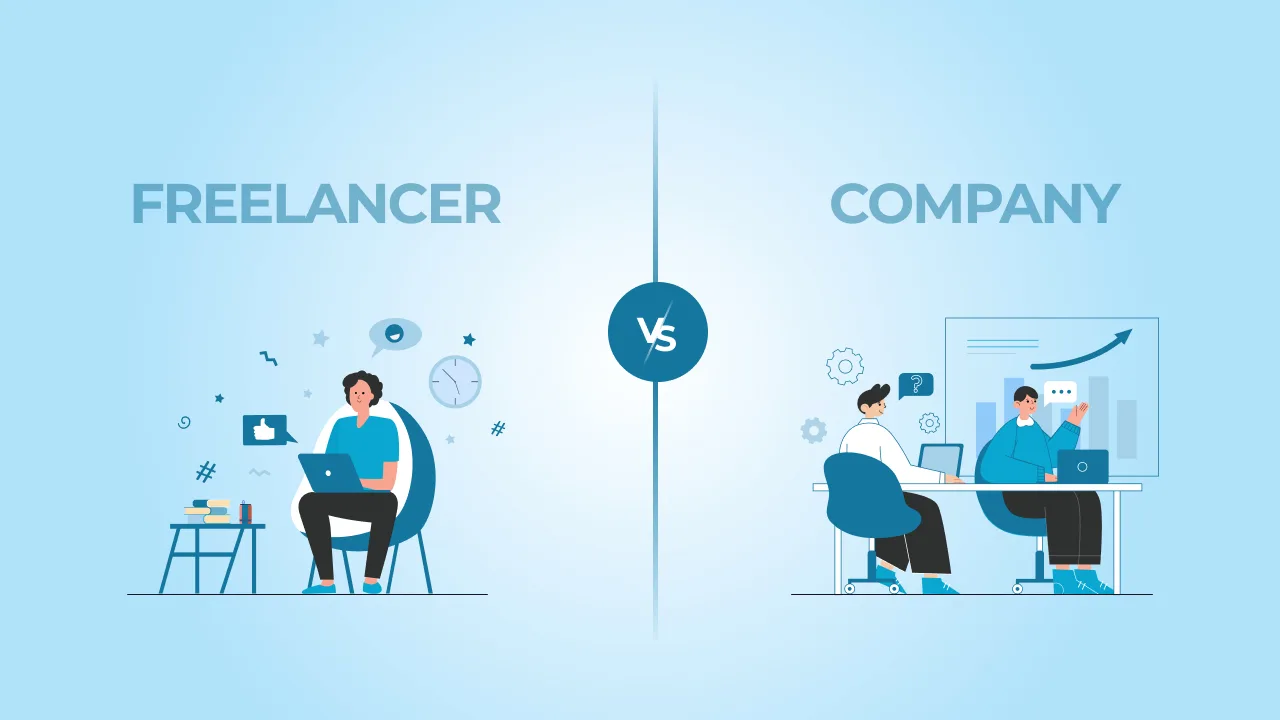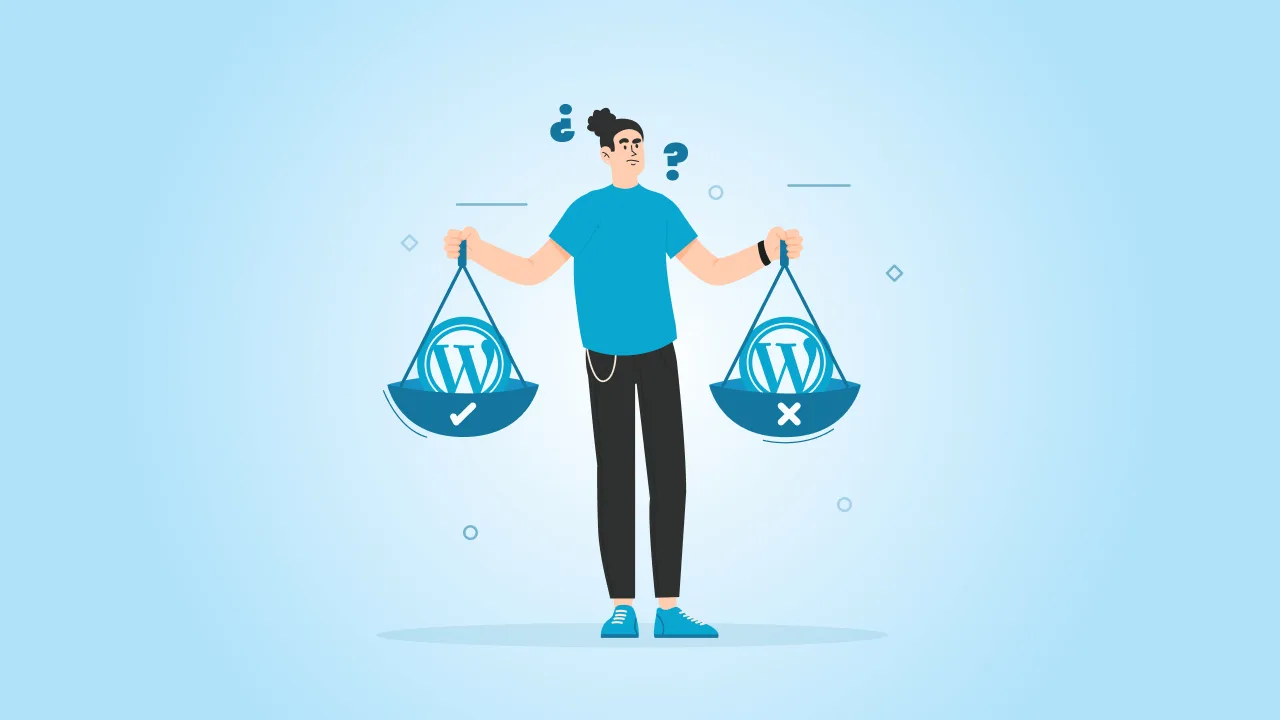Drupal and WordPress are two platforms that require no introduction. And why is that?
Cause in the last decade and a half, they have firmly established themselves as the world’s leading content management systems (CMS), powering millions of websites across diverse industries.
Now, whether you are running a personal blog, an eCommerce store, or a high-traffic enterprise portal, chances are you have heard of these names before.
But how do you decide which platform is best for your website in 2026?
Though both Drupal and WordPress are robust and versatile, they cater to different needs, technical expertise, and business goals.
In this comprehensive comparison, we will delve into their unique strengths, and key differences, and help you determine which CMS aligns with your vision.
Current Market Share
In 2026, Drupal and WordPress remain dominant players in the CMS space, each catering to distinct needs and audiences.
Drupal: The Enterprise Specialist
While Drupal’s market share is smaller, estimated at 2.3% of all websites, it has carved out a stronghold in specific sectors where scalability, security, and flexibility are critical. Key areas of influence include:
- Enterprise websites, where complex functionality and custom workflows are required.
- Government portals, such as those of the European Commission and NASA, demand the highest standards of security.
- Educational institutions and large non-profits, leverage Drupal’s ability to manage intricate content hierarchies and multiple user roles.
Drupal’s smaller market share belies its importance in high-value, mission-critical projects. Its developer-first approach and modular architecture make it the top choice for organizations with complex needs and a focus on long-term scalability.
WordPress: The Dominant Force
WordPress holds an impressive43% share of the global CMS market, continuing its reign as the most widely used platform for websites of all kinds. It is especially popular among:
- Small to medium-sized businesses seeking a cost-effective and user-friendly solution.
- Bloggers and content creators, leveraging WordPress’s intuitive interface and powerful SEO capabilities.
- eCommerce platforms, where WooCommerce drives its widespread adoption for online stores.
WordPress owes its dominance to its vast ecosystem of plugins and themes, which allow users to create and customize websites with minimal technical expertise. Its versatility ensures it remains the go-to choice for both beginners and experienced developers.
Drupal vs. WordPress: A Feature Comparison
| Feature | Drupal | WordPress |
|---|---|---|
| Ease of Use | Developer-focused; requires technical expertise for setup and customization. | User-friendly interface; suitable for beginners and non-technical users. |
| Customization | Highly customizable via modules; ideal for complex and bespoke solutions. | Extensive plugin ecosystem with over 50,000 options; great for quick, flexible customizations. |
| Performance | Designed for high-performance applications; excels in large-scale and high-traffic websites. | Performs well with proper optimization, but may rely heavily on third-party plugins for advanced caching and speed improvements. |
| Security | Known for rigorous security measures; trusted by governments and enterprises for sensitive data handling | Offers robust security with plugins and regular updates, but is more prone to vulnerabilities due to its widespread use and plugin reliance. |
| SEO Capabilities | Advanced out-of-the-box SEO tools; require manual configurations for optimal results. | User-friendly interface; suitable for beginners and non-technical users. |
| Scalability | Handles large-scale projects seamlessly; ideal for websites with heavy content and traffic. | Scales well for small to medium-sized projects; may require additional optimization for enterprise-level scaling. |
| Community and Support | Smaller, highly skilled community; extensive documentation and dedicated forums. | Large global community; abundant tutorials, forums, and third-party resources available. |
| Cost | Open-source but can have higher development and maintenance costs due to its complexity. | Open-source with lower upfront costs; plugins and themes may require additional expenses. | Use Cases | Enterprise websites, government portals, educational institutions, and custom web applications. | Small to medium business websites, blogs, e-commerce stores, and personal portfolios. |
Let’s compare each feature in detail.
1. Ease of Use
Drupal
Compared to WordPress, Drupal is a more developer-centric platform. This means it requires technical expertise for setup, configuration, and customization.
On top of that, its user interface is a bit complex and powerful. So it’s ideal for developers who need full control over their site’s functionality. And, for non-technical users, the learning curve can be quite steep, and creating a website without the help of a developer will be slightly challenging.
However, once set up, Drupal offers robust tools for managing content and creating highly customized websites.
WordPress
On the other hand, WordPress is designed with ease of use in mind, which makes it an excellent choice for beginners and non-technical users.
It has an intuitive dashboard that allows users to quickly create and manage content, install themes, and add plugins without needing any coding knowledge. In addition, WordPress’s vast library of pre-built themes and plugins simplifies the website creation process, so it’s quite easy to set up a website with minimal effort.
- Drupal: Best suited for users with technical expertise or those working on complex, custom projects.
- WordPress: Ideal for beginners or anyone looking to create a website with minimal technical knowledge.
2. Customization
Drupal
Drupal is certainly known for its exceptional flexibility and customizability, and this makes it an ideal option to build complex and highly tailored websites.
Its modular architecture is pretty popular with developers because it lets them create custom solutions using thousands of modules that can be combined for specific functionality.
That is why it is perfect for large-scale projects that require intricate features, such as custom content types, user roles, and workflows.
Having said that, building a completely bespoke site on Drupal typically requires extensive development resources and technical expertise.
WordPress
WordPress equally offers a broad range of customization options, primarily through its vast selection of plugins and themes. With over 59,000 plugins available, users can easily add functionality such as SEO tools, contact forms, eCommerce, and much more, without needing to write any code.
WordPress also supports a wide variety of themes that can transform the appearance of a site. Even though WordPress offers significant customization, however, it is slightly less flexible than Drupal for highly specialized or large-scale websites, especially those that require custom back-end functionality.
- Drupal: Offers high levels of customization, ideal for complex, large-scale websites with specific functional needs.
- WordPress: Provides easy and quick customization via plugins and themes, but may fall short for highly bespoke or enterprise-level solutions.
3. Performance
Drupal
Drupal is originally built to handle large, complex websites with high traffic volumes. Its modular architecture and caching mechanisms are designed to improve and optimize performance at scale.
For example, Drupal’s built-in caching and content delivery network (CDN) integration helps ensure fast load times even on large-scale sites. It is well-suited for enterprise-level projects, government portals, and other high-traffic applications.
Additionally, developers can further optimize performance with custom configurations, making Drupal an excellent choice for websites that need exceptional performance.
WordPress
WordPress performs outstandingly well for smaller to medium-sized websites but when it comes to larger or even high-traffic sites, it may require additional optimization.
WordPress definitely has a ton of caching plugins and tools (like WP Super Cache and W3 Total Cache) that help improve speed, but performance can degrade if a site is poorly optimized or overloaded with too many plugins.
For eCommerce sites or high-traffic platforms, WordPress may require additional configurations, such as a content delivery network (CDN) and a robust hosting plan, to ensure smooth performance.
- Drupal: Excels in handling large-scale websites and high-traffic environments with superior built-in performance features.
- WordPress: Suitable for smaller to medium-sized websites, but requires additional optimization for high-traffic or resource-intensive sites.
4. Security
Drupal
Renowned for its strong security features, Drupal is often the CMS of choice for organizations handling sensitive data.
It follows a rigorous security protocol, and its development community is proactive in identifying and addressing vulnerabilities.
Drupal offers top built-in security measures, including role-based access controls and secure user authentication, which are super essential for high-security environments such as government and enterprise websites.
Plus, it has a dedicated security team that regularly releases updates and patches to ensure ongoing protection.
WordPress
If not more, WordPress is equally secure, but again due to its widespread popularity, it is often targeted by hackers, making it more susceptible to security issues.
For better or worse, WordPress relies heavily on third-party plugins and themes, and vulnerabilities in these add-ons can sometimes bring risks. That said, the WordPress community provides regular updates and security patches.
To improve their website security further, users are advised to choose trusted plugins, use WordPress security plugins like Wordfence, and ensure the site is kept up to date.
While WordPress is secure with proper management, it requires more active maintenance and monitoring compared to Drupal.
- Drupal: Known for its robust security features, making it ideal for sensitive, high-stakes websites that require stringent safeguards.
- WordPress: While secure when properly maintained, it can be more vulnerable due to the reliance on plugins and themes, requiring extra vigilance in security practices.
5. SEO Capabilities
Drupal
With its built-in features and flexibility, Drupal offers a strong foundation for SEO. It includes advanced tools for creating SEO-friendly URLs, meta tags, and structured data, which are considered to be super important for search engine optimization.
Modules like Pathauto, Metatag, and XML Sitemap can be easily integrated to automate SEO tasks and improve site visibility.
However, SEO in Drupal requires more hands-on management compared to WordPress, which offers more out-of-the-box ease of use.
For developers and businesses with complex SEO needs, Drupal provides a highly customizable SEO environment.
WordPress
On the flip side, WordPress is known as one of the most SEO-friendly CMS platforms. It provides excellent out-of-the-box SEO capabilities, particularly through popular plugins like Yoast SEO and Rank Math.
These plugins offer step-by-step guidance for optimizing every page and post, making it easy to ensure the website meets SEO best practices.
WordPress also simplifies tasks like creating SEO-friendly URLs, generating sitemaps, and editing meta descriptions. Its user-friendly interface and powerful SEO plugins make WordPress an excellent choice for businesses and individuals who want to implement solid SEO strategies with minimal effort.
- Drupal: Provides advanced, customizable SEO tools but requires a more hands-on approach for optimization. Ideal for sites with complex SEO needs.
- WordPress: Offers easy-to-use SEO features, especially with plugins like Yoast, making it highly accessible for beginners and those seeking quick SEO results.
6. Scalability
Drupal
Designed for scalability, Drupal is an ideal choice for large-scale websites that need to grow and adapt over time. Its flexible, modular architecture enables the seamless addition of new features and functionalities, even as traffic or content volume rises.
This scalability is a key reason why Drupal is commonly used for enterprise-level sites, government portals, and large educational institutions. It can handle thousands of pages, complex workflows, and large user bases without compromising performance.
Additionally, Drupal’s support for Drupal multisite setups and content staging further boosts its ability to manage multiple projects from a single platform, enhancing overall scalability.
WordPress
WordPress is well-suited for small to medium-sized websites but may experience performance issues when handling very large sites or high-traffic volumes.
Yes, it offers scalability through caching, optimization tools, and reliable WordPress hosting, but its performance depends largely on the number and quality of installed plugins.
So as a website grows, WordPress often requires additional manual optimization and maintenance. However, for smaller businesses or personal blogs, WordPress remains a highly scalable option with the right infrastructure.
- Drupal: Excellent scalability, ideal for large, complex websites with high traffic and extensive content management needs.
- WordPress: Scales well for smaller to medium-sized sites but may require extra optimization for larger projects.
7. Community and Support
Drupal
Not as big as WordPress, but Drupal certainly has a highly specialized and engaged community. The Drupal community is made up of developers, designers, and organizations who contribute to the platform’s continuous improvement.
This community-driven approach ensures that Drupal remains a highly customizable and secure CMS.
But then again, because of its technical nature, the Drupal community tends to be more developer-centric. That means support is often found through forums, dedicated Drupal meetups, and Drupal-specific conferences.
Additionally, many enterprise-level service providers offer professional support for Drupal users.
WordPress
With one of the largest and most active communities in the CMS world, WordPress has millions of users, developers, designers, and contributors.
This huge network offers plenty of online resources like forums, tutorials, blogs, and official documentation. It’s super easy to find solutions to common problems, and the community is very welcoming to newcomers and non-tech-savvy people.
WordPress also provides many premium support options from third-party companies and individual developers. The community stays active with regular meetups, WordCamps, and lots of third-party tutorials and resources.
- Drupal: Smaller, more developer-focused community with strong support for complex, enterprise-level solutions.
- WordPress: Large, diverse community with a wealth of resources and easy access to support, making it accessible for users of all levels.
8. Cost
Drupal
Drupal itself is an open-source platform. In simple terms, it’s free to download and use.
However, due to its complexity and the need for specialized development, the total cost of a Drupal website can be higher. Custom Drupal website development, theming, and ongoing maintenance typically require a team of experienced Drupal developers, which adds to the overall cost.
Furthermore, Drupal hosting can be more expensive compared to other CMS platforms, especially for larger or high-traffic sites. Organizations also need to factor in the cost of training staff or hiring developers with Drupal expertise.
WordPress
Just like Drupal, WordPress is also open-source and free to use, with the same low upfront costs as Drupal.
However, the cost of a WordPress website can vary depending on themes, plugins, and hosting. Many themes and plugins are free, but premium options can incur additional costs.
WordPress websites tend to be more affordable to build and maintain, especially for small businesses or personal websites.
Since WordPress is easier to use and doesn’t require specialized development knowledge unlike Drupal, many users can create and maintain their websites without the need for expensive WordPress developers for hire.
- Drupal: Free to use, but typically more expensive to develop and maintain due to its complexity and the need for specialized developers. Ideal for large-scale, enterprise-level projects.
- WordPress: Free to use with lower development and WordPress maintenance costs, making it a more budget-friendly option for small to medium-sized websites.
Predictions for 2026: The Future of Drupal and WordPress
(Insights from Our Experts)
- AI Integration: Both platforms will use AI to enhance content creation, SEO, and user experience.
- Design Advancements: AI tools will make design more dynamic and interactive.
- Headless CMS Growth: Drupal will lead in API-first solutions, while WordPress adds more headless features.
- AI for SEO: Both platforms will adopt AI-driven SEO tools for automation and optimization.
- Performance Focus: Drupal will excel at large-scale sites, while WordPress will improve speed and scalability.
- Security Enhancements: Both platforms will strengthen security, with Drupal focusing on enterprise-level features.
- WordPress for SMBs: WordPress will dominate small businesses and personal websites due to ease of use.
- AI-First CMS: By 2030, both platforms may incorporate AI for fully automated content management and design.
Conclusion
Looking ahead, both Drupal and WordPress are set to keep growing and improving. Each platform has its own strengths—Drupal excels in scalability, security, and complex solutions for large businesses, while WordPress is known for its ease of use, accessibility, and speed for small businesses and personal sites.
The right CMS for you will depend on your needs. If you need flexibility and control for large, complex websites, Drupal is probably the better choice. If you want an easy-to-use platform with a large ecosystem and fast setup, WordPress is a great option.
Still, debating between Drupal and WordPress? Let cmsMinds Help You.





